
Photo Credit : Zeina Kassem
In a continuing series on my trip to Jordan, this post covers many short but really impactful moments on my trip. Hope you enjoy the longer than normal read.
About an hour’s drive outside of Amman is an incredibly old, historic, and beautiful place – the city of Jerash. It is one of the most intact Roman ruins in the world. As my architect friend who traveled with me said, “Why doesn’t the whole world know about this?”
Jerash was continuously occupied since the Bronze Age. It was finally an earthquake that ran the inhabitants out. The ancient city was (and still is, in parts) buried under the shifting sands of this part of the world. What has been uncovered is simply stunning. I have been to Rome and other Roman ruins around the globe but this place knocked my socks off. From the pillars of the Oval Forum (pictured above) to the South Theater, it is jaw dropping in it’s architectural wonder and intactness.
One starts at Hadrian’s Arch but that was not even the entrance to the city. Intricately carved, it stands at the entrance that all visitors take now. And then it goes on and on and on from there. My travels were a work trip so we did not have enough time to visit the entire city but I am so looking forward to returning to Jerash and spending a day there. And I will bring my good camera (and better photographic skills) as this is a photographer’s dream. Mosaics, angles, arches, blue skies. It was hard to get a bad shot.
There is just something about being in a place that is so old that stirs my soul. The history, the stories, the lives lived there.
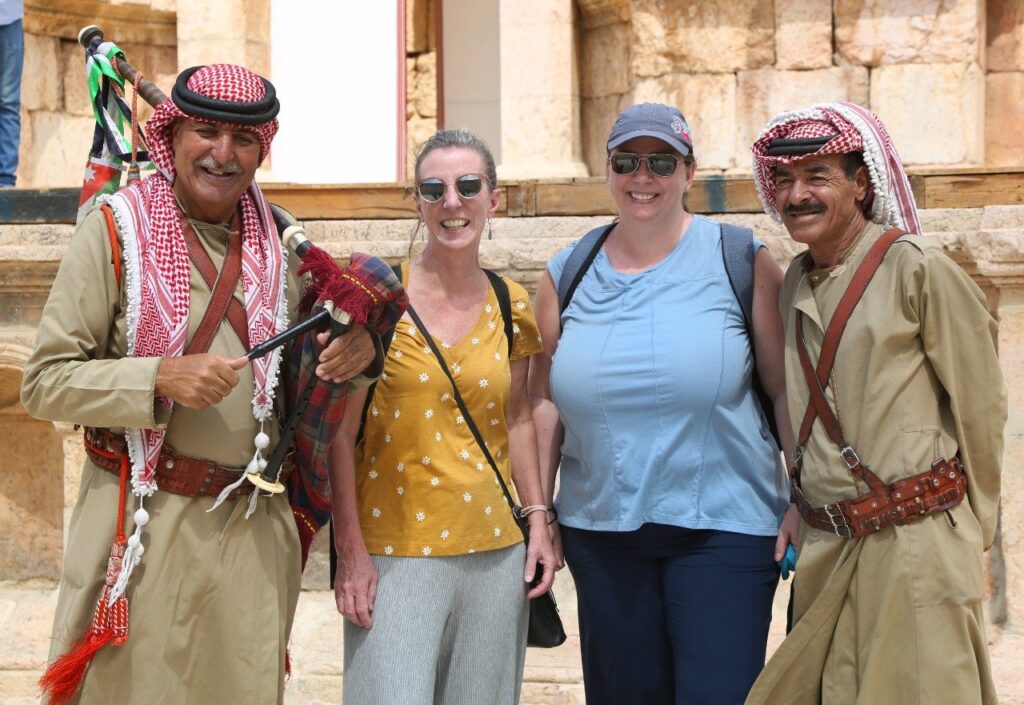
Photo Credit : Zeina Kassem
Interestingly enough, I was at Jerash on the 20th anniversary of 9/11. As this event was a painful moment for me and my family and friends personally, I had told a friend that I was happy to be away from the States and not have to relive that day. But I had never thought about what it would be like to be away and in a Muslim country for this anniversary.
As I wandered the Oval Forum, a friend and I could hear the sweet strains of “Amazing Grace” being played on bagpipes on this painful but reverent day for us.
In Jordan. A Christian song. On Bagpipes. On 9/11. Playing the sweet song I sang to my kids every night before they went to bed. When I say there was magic that happened, I mean it.
My friend who was traveling with me (not pictured above though she is a friend!) heard it and said “They are playing this for 9/11. Maybe not but that is the way I hear it”. Beautiful words for a beautiful moment.
They made our day but, I promise, if you visit, you will also hear the sweet strains of bagpipes in Jerash. They were ruled by the Brits for a long time so bagpipes (though a different version) have made it into Jordanian culture. It is one of the traits I love about Jordan – they have taken centuries of lemons and made the sweetest lemonade.
I will just take the magic of Bedouin men playing that song so special to me on that day in that place. Sometimes you just have to grab the magic of it all.
The South Theater, where you will find the bagpipe guys, is a 3000-seat open theater used for events and performances, still to this day. There is a spot in the middle of the stage where you can stand and, speaking in a quiet voice, your words can be heard all the way at the top of the theater. Very cool engineering marvel.
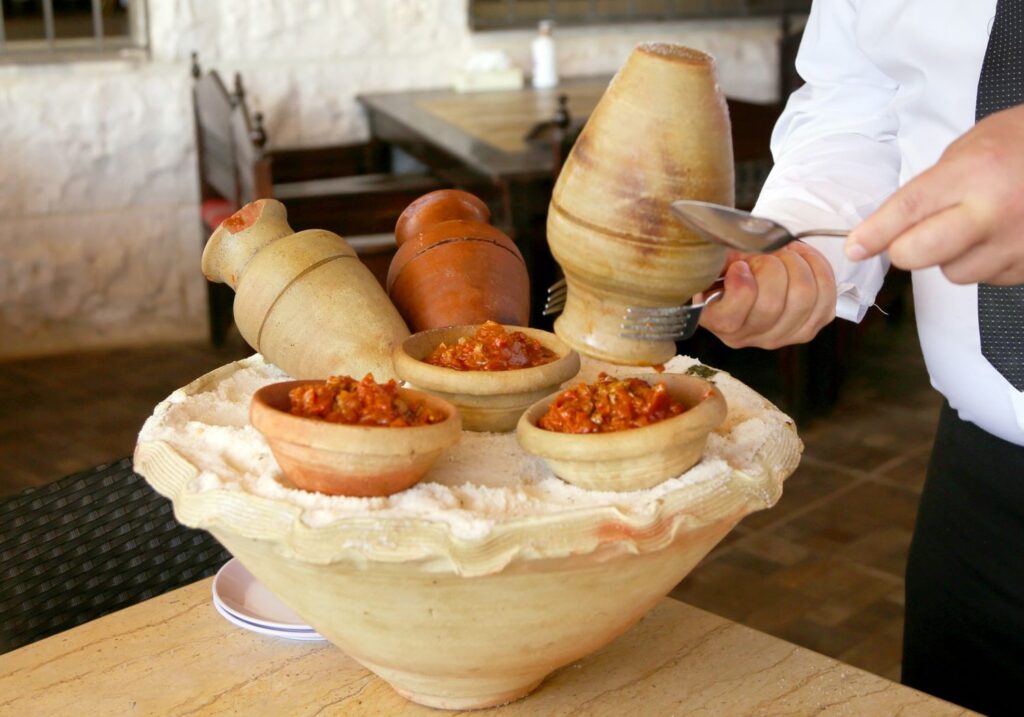
Photo Credit : Zeina Kassem
I promise you, there will not be a post about Jordan anywhere in my life that will not mention food because … fabulous.
In Jerash, we had a dish that has been made the same way for centuries. The meat and rice portion was cooked in a huge pan then turned over in a ceremonious “whomp” … all intact on a huge platter! But I loved the sauces and veg. Cooked in clay pots over coals coated in salt. And turned upside down to empty with two forks. Look at that photo above. Oh, for that level of cooking skills and coordination.
Oh, my, Jerash should have had it’s own post but then the series would have been so long. Did I tell you I LOVE Jordan. Yes, think I have. But there’s more …

Photo Credit : Zeina Kassem
This mountain was a shift for this group. It brought out so many emotions.
For those of you who don’t know (I did not either) , Mount Nebo is where Moses looked out on the Holy Land that he would never enter. It does and he did not.
A tiny bit of history … it was purchased by the Vatican way back when and everyone agrees that is is amazingly well cared for.
AND, every one of the three major religions from the region are honored here. I show you the beautiful piece of art commissioned to grace this sacred place but what I do not show you (but could) is the English, Hebrew and Arabic inscriptions on it. It is really quite beautiful how it is done. Moses played a large role in all three religions and all are honored.
There is a beautiful church at the top of the mountain that has wonderful mosaic examples inside and out. It is a “quiet” church where you have to keep your voices low or silent. It is a quietly powerful place, with a very strong presence. It was quite moving for all of us.

Photo Credit : Zeina Kassem
On the far side of the church, you can walk to the edge of the mountain and look over all Moses saw – the Dead Sea, The Moses Valley, the Holy Land. It is all so beautiful. Overlooking all of this is a gorgeous metal sculpture representing the snake and staff from the famous story of Moses saving his people.
Even if you are not religious, most of us have had some sort of religion education and know many references to the Old Testament stories. It is quite a powerful moment to stand in a place where Moses did and look out over the view that he saw.

Photo Credit : Zeina Kassem
Jordan is famous for its beautiful mosaics. We spent a little time at a mosaic school, a cooperative for disabled artists that all work with mosaics. There are different levels of skill within the school. We were not able to meet any students as they all have to work from home because of Covid. But we diid meet the artist who runs the school. He is a master at mosaics. These eggs are his works – beautiful hollow ostrich eggs covered in thousands of the tiniest little chips of stone. True works of art.
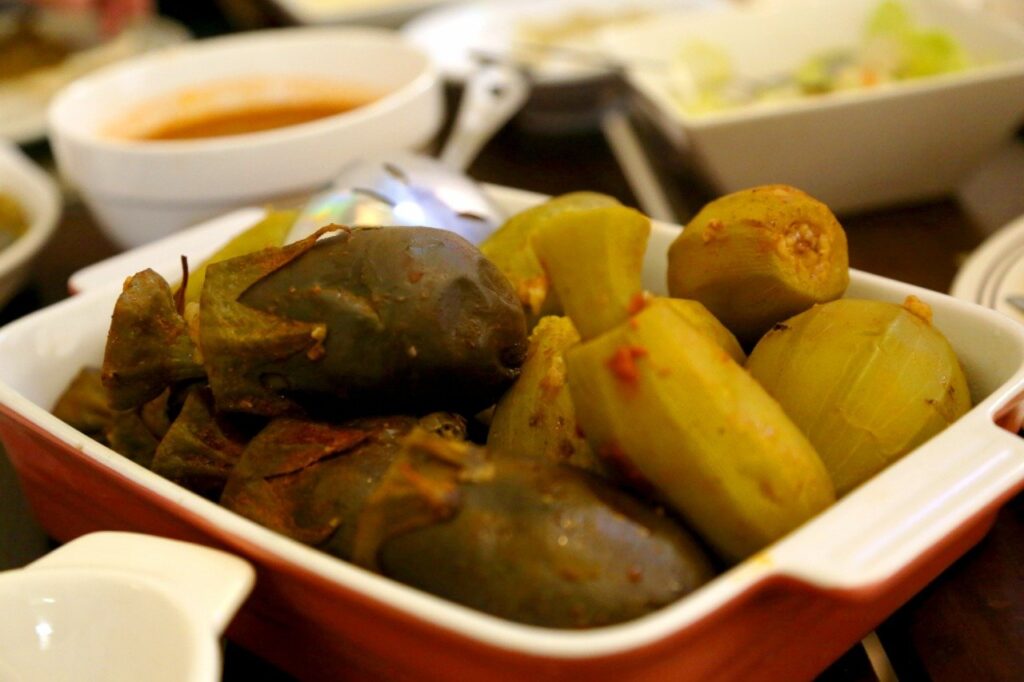
Photo Credit : Zeina Kassem
Next, we made our way to the cool little town of Madaba which is know for its mosaics. Out first stop was an amazing family restaurant for lunch. The wife made all the food from scratch, all ingredients locally sourced. She made the tastiest mahashi, little squash and eggplants stuffed with rice and meat. The food was fabulous and the home so creatively decorated. The food is so good, in fact, that President George W. Bush and his wife Laura ate there a few years ago and they are going back again soon.
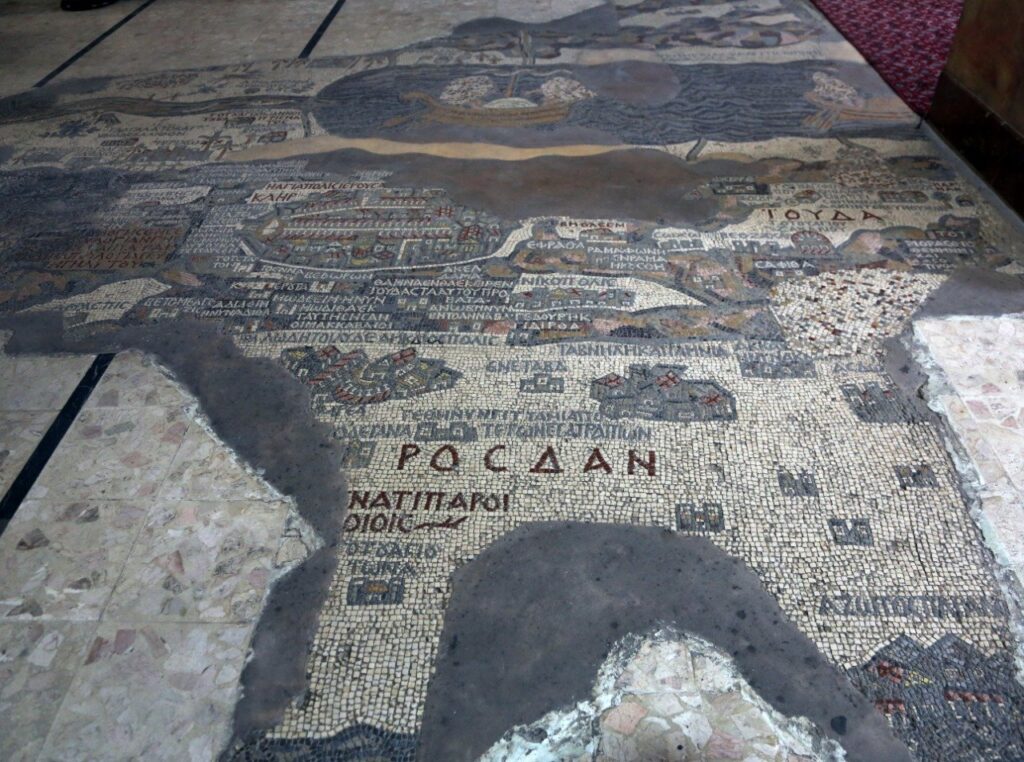
Photo Credit : Zeina Kassem
In the middle of Madaba there stands a really old church, St. George’s Church. Inside, there is the earliest know depiction of the Holy Land, all done in mosaics. This piece of art was created in the 6th century! As I said in my last post, Jordan has layer upon layer of history.
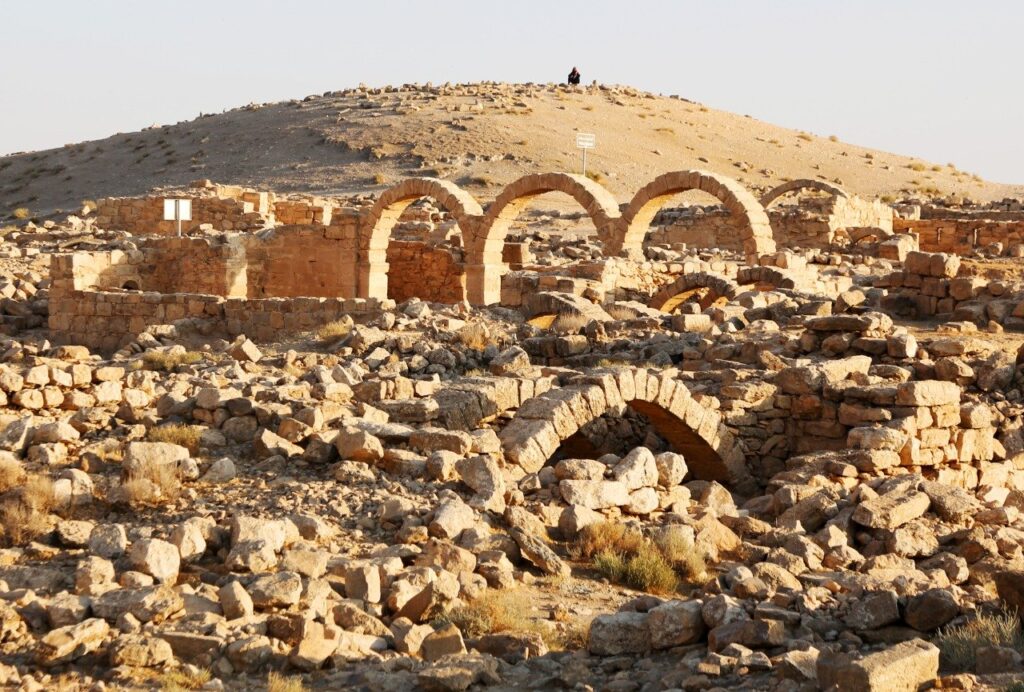
Photo Credit : Zeina Kassem
Our last stop for the day was Um Ar Rasas, a UNESCO World Heritage site. This was once a 6th century town slowly being excavated. You can see the remains of homes and churches. Inside one large building, the Church of St. Stephen, is the largest mosaic in all of Jordan, incredibly preserved, depicting a map of the region.
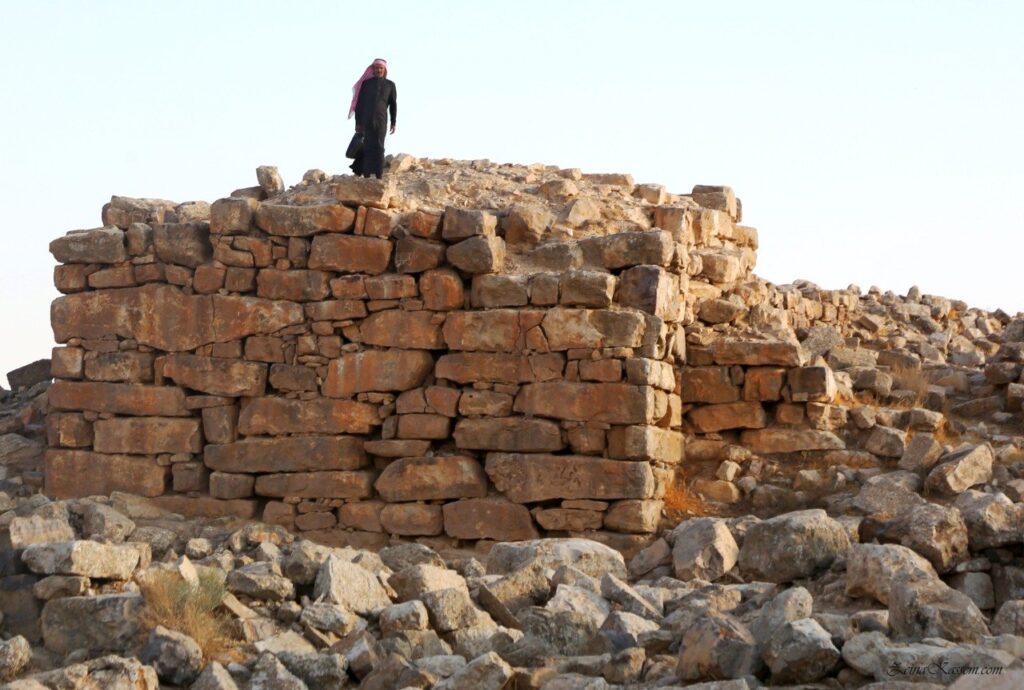
Photo Credit : Zeina Kassem
One of my favorite moments at Um Ar Rasas was when this incredible noble looking and photogenic Bedouin man came down from his perch to visit with our small group, the only people at this historic site. The Bedouins are known to be very friendly people and we loved getting the chance to chat with him
Another long post (my apologies) and there is more to come. Next up, the crown jewel of Jordan … Petra … and one truly magical night.
© Beth Rowan https://www.tapestry-travel.com/blog/the-magical-kingdom-of-jordan-part-2